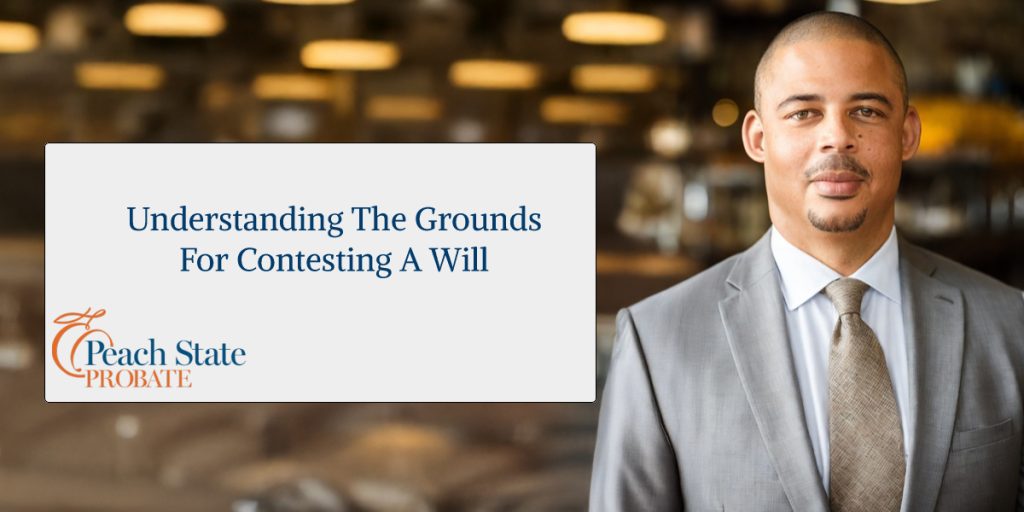## Delving into the Reasons for Challenging a Will: Understanding Contested Wills
Contested wills arise when individuals dispute the validity or terms of a deceased person’s will. This legal battle can lead to complex challenges that require a deep understanding of estate law, as well as the specific circumstances surrounding the creation and execution of the will. Many factors can contribute to the legal defiance of a will, from issues related to the decedent’s mental capacity at the time of signing to the presence of undue influence by parties involved in the estate planning process. It is essential to comprehend these factors to navigate the challenging process of contesting a will effectively.
To successfully contest a will, one must cite valid grounds established in probate law. These grounds are typically grounded in alleged shortcomings during the drafting or execution phases of the will. In Georgia, the law permits individuals to contest a will on various bases, including lack of testamentary capacity, improper execution of the will, or evidence that the will was procured through fraud or undue influence. Understanding these legal standards is crucial when determining whether there are sufficient grounds to pursue a contest.
Engaging with contested wills involves not only knowing the legal terms but understanding the emotional and familial ramifications surrounding such disputes. The grief surrounding a loved one’s passing can often complicate the situation, leading to further conflict among family members or beneficiaries. Recognizing the intersection of legal, emotional, and familial dynamics is vital to addressing these issues comprehensively.
## Defining Contested Wills in the Legal Sphere
Contested wills are legal instruments challenged by individuals claiming the will is invalid or does not accurately reflect the intentions of the deceased. When disputes arise, they can lead to lengthy court battles, often putting a strain on familial relationships. These contests require careful legal consideration, as the courts take into account evidence presented by parties asserting their claims against the will.
In many cases, a will may be contested because it seemingly contradicts previous expressions of the deceased’s wishes, suggesting that circumstances surrounding the will may have changed at the time of its execution. Another common reason for contesting a will includes claims that the decedent lacked the mental capacity to make sound decisions when signing the document. This could be due to mental illness, cognitive decline, or other factors impacting the individual’s ability to understand the nature of their estate and the implications of their decisions.
The legal ramifications associated with contested wills vary widely depending on jurisdiction and the specific details of each case. In Georgia, those involved in a will contest must be able to provide substantial proof supporting their claims, whether related to capacity, undue influence, or execution defects. Navigating a will contest requires experienced legal guidance to ensure all claims are backed by the necessary evidence and are presented persuasively in a court setting.
## The Importance of Understanding Contested Wills
Understanding this topic is crucial for individuals involved in estate planning or those dealing with the aftermath of a loved one’s passing. The legal landscape surrounding contested wills can be vast and intricate, filled with nuanced terminology and procedural regulations that, if overlooked, can compromise one’s ability to execute or contest a will effectively. Being informed empowers individuals to make decisions that align with their interests and the intentions of the deceased.
Additionally, the topic of contested wills is significant due to the potential financial implications and family dynamics at play. Disputes over a will can lead to lengthy litigation, often resulting in decreased assets available to beneficiaries and heightened tension among family members. Recognizing the grounds on which a will could potentially be contested allows individuals to preempt conflicts by ensuring proper estate planning and documentation.
Lastly, the emotional weight of contesting a will should not be understated. It can create turmoil and lengthy disputes that exacerbate grief and hinder the healing process. By understanding the complexities and ramifications of contested wills, individuals can navigate their decisions with care and caution, ensuring the wishes of the deceased are honored as much as possible without unnecessary conflict.
## Legal Framework Surrounding Contesting Wills
The legal framework for contesting wills is anchored in state laws and regulations, which can vary considerably across jurisdictions. In Georgia, the probate process requires adherence to specific laws regarding the validity of a will. Key components influencing the legality of a will include the decedent’s testamentary capacity, the presence of witnesses during the signing of the will, and adherence to formal execution requirements.
One of the primary legal grounds for contesting a will in Georgia revolves around testamentary capacity. A testator must possess the mental capacity to understand the nature of making a will, comprehend the extent of their assets, and recognize the beneficiaries of their estate. When a will is contested on these grounds, claimants must provide compelling evidence, which may entail medical records or testimony from individuals who interacted closely with the deceased.
Another crucial aspect of the legal framework involves the potential for undue influence or fraud. If it is demonstrated that a third party coerced the testator into drafting certain elements of the will or misrepresented facts upon which the testator relied, this may provide grounds for rendering the will invalid. Courts will examine the circumstances surrounding the will’s creation, including the relationships between involved parties, to ascertain whether undue influence occurred.
## Real-World Illustrations of Contested Wills
Real-world examples of contested wills often reveal the complexities of estate disputes and their wide-ranging implications. One notable case involved a deceased individual whose later will seemed to contradict a prior will that explicitly divided assets among various family members. Discontent with the new terms, certain family members contested the will on the grounds that the testator lacked mental capacity at the time of its creation, claiming that he was influenced by a caregiver seeking to gain from the estate. The court proceedings highlighted the importance of scrutinizing the context under which the will was executed, ultimately leading to a determination in favor of the previous will.
Another intriguing case involved a wealthy entrepreneur whose will designated a charitable organization as the primary beneficiary, contrary to earlier estate planning discussions expressing the individual’s desire to provide for family members. Disputes emerged between surviving relatives who felt slighted, asserting that the will was the product of undue influence from charity representatives. This led to extensive litigation over the definition of undue influence and the examination of communication between the testator and the charity before the will was executed.
A third case showcased the potential ramifications when individuals fail to formalize their wishes sufficiently. A couple jointly owned properties but executed a will that seemingly favored one child over others without clear justification, resulting in a contest by those feeling unjustly treated. The court ruled in favor of a more equitable distribution, emphasizing the necessity for explicit terms and clarity in estate documents to prevent disputes and ensure fair treatment among heirs.
## Actions You Can Take Regarding Contested Wills
If you find yourself in a situation where you need to contest a will, there are several actions you can take to navigate the process. First, gather all relevant documentation pertaining to the deceased’s previous wills, estate assets, and any other pertinent records. This documentation will serve as the foundational evidence needed to substantiate your claims should you proceed to court. Ensure that you have copies of all documents available, as it will streamline the legal process.
Second, it is essential to communicate your intentions with other beneficiaries and family members. While some disputes can escalate quickly into drawn-out legal battles, part of the resolve can often be found in open discussions. Sharing your reasoning for contesting the will may diffuse potential tensions and reach an agreement without further legal intervention.
Lastly, securing legal representation should be one of your foremost actions if you consider contesting a will. Legal professionals experienced in probate law can provide guidance to ensure you adhere to timelines and procedural requirements. They can also help assess the merits of your case, advise you on the necessary evidence, and represent your interests in court if litigation becomes necessary.
## Common Pitfalls to Avoid in Will Contests
Engaging in the contestation of a will can lead to numerous pitfalls that may harm your case if not adequately addressed. One common mistake is failing to adhere to statutory timelines for contesting a will. Each state has specific deadlines regarding when you can file a will contest after being notified of the will. Ignoring these deadlines might bar you from pursuing your claim altogether.
In addition, some individuals mistakenly believe that verbal agreements or promises made by the deceased can supersede a written will. This misconception can lead to misguided efforts in contesting a will based on hearsay rather than concrete evidence. Courts tend to dismiss claims based on hearsay, stressing the importance of having clear, written documentation that reflects the deceased’s intentions.
Another pitfall is overlooking the importance of emotional management during the contesting process. Familial disputes can become heated, leading to counterproductive tensions among beneficiaries. Approaching conversations regarding the will with empathy and understanding can prevent unnecessary escalation and may lead to more amicable resolutions.
## Consulting an Attorney: When to Seek Guidance
Understanding when to consult an attorney is critical in the will contestation process. If you suspect that the will may contain terms that do not align with the deceased’s intentions or if there are concerns surrounding the circumstances of its creation, seeking legal counsel is advisable as soon as possible. An attorney with knowledge of probate law can assess whether there are valid grounds for contesting the will based on your unique circumstances.
Additionally, if you encounter aggressive resistance from other family members or beneficiaries, legal representation becomes crucial. An attorney can help protect your rights and provide necessary support in navigating emotionally charged family dynamics while remaining focused on legal considerations. They can also assist in gathering the necessary evidence to substantiate your claims and represent you effectively in court proceedings.
Finally, if you aspire to contest a will but feel overwhelmed or unsure about your position, consulting with legal counsel can provide clarity. An attorney can review your situation, provide you with options, and help devise a strategic plan to pursue your contest in a way that aligns with your long-term interests, reducing anxiety throughout the process.
## The Advantages of Professional Legal Representation
Seeking legal representation during a will contest is critical for numerous reasons. An attorney fundamentally provides expertise in navigating the often-complex probate laws and court processes, ensuring that your case complies with all necessary regulations and legal standards. They can advise you on the best approaches to frame your argument, present compelling evidence, and bolster your claims in court.
Additionally, legal professionals have experience dealing with opposing counsel and represent clients in intricate disputes. This experience grants them insights into judges’ preferences and behavior, allowing them to tailor arguments effectively to maximize the potential for favorable legal outcomes. Professional representation can improve advocacy and create a more coherent presentation of your case.
Moreover, contesting a will often involves sensitive family dynamics, which can lead to heightened emotions and disputes. Having an attorney by your side helps maintain a level of professionalism, alleviating the emotional burden by allowing you to focus on grieving your loss and healing rather than navigating the complexities of legal proceedings. Legal representation ensures that necessary interests are prioritized and that you receive informed guidance throughout the entire contest process.
## How Peach State Probate Can Assist in Contesting a Will
Peach State Probate stands as a trusted ally for individuals facing the challenging waters of contested wills in Georgia. Their team possesses a profound understanding of estate law and the common grounds for contesting wills, making them ideally positioned to guide you through the complexities of this legal process. They approach each case with a personalized strategy aimed at achieving the best possible outcome for clients while considering the emotional dynamics involved.
When you engage with Peach State Probate, you will benefit from a thorough evaluation of your case. Their attorneys will assist you in identifying potential grounds for contesting the will, helping you understand your position and options. The team is well-versed in the legal framework surrounding wills and estates, ensuring that you are confident in your understanding of the law as it applies to your situation.
Additionally, Peach State Probate is committed to providing compassionate representation throughout the will contest process. The firm’s attorneys recognize that losing a loved one is a sensitive and emotional experience, and they aim to be responsive to clients’ concerns while advocating for their rights vigorously. Whether through negotiation or litigation, Peach State Probate prepares to address the complexities of contested wills diligently.




